Organisational design and development made easy.
Engage
|
Hire
|
Develop
|
Assure
|
|
Deeply understand your organisation with science-backed analytics on your culture, team design, and engagement. |
Automatically match to candidates who are a great fit for your team culture and who are intrinsically motivated to succeed. |
Back your onboarding, compliance and skill development with industry-leading credentialling, competency and capability expertise.
|
Reimagine skills assessment and certification with dedicated tools designed to elevate your competency frameworks.
|
How we do it
Resources
Log in
.png?width=383&height=200&name=team%20(1).png)
Me, MY TEAM, My Company
My work personality is:
The Doer ✅
"Let's get it done!"
Your personality has been mapped against the types of work crucial for high-performing teams.
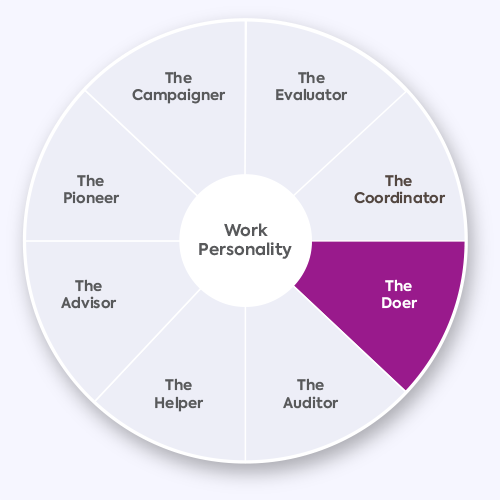
Introduction
A perpetually reliable force in the workplace, the Doer is known for their dependable performance and efficiency. Their modus operandi is deeply rooted in practicality and task orientation, making them a results-driven powerhouse.
Characterised by direct and straightforward communication, you'll always know where you stand with them. If you value attention to facts, intricate details, and living in the present moment, then you’ll certainly appreciate our deep dive into the Doer's personality type.
Main preferences for work
This personality type thrives on favoured routines, values the certainty of meeting deadlines, and gravitates towards well-defined tasks. The Doer cherishes stability and predictability in their workflow while upholding a strong commitment to quality and accuracy.
- Enjoys routine and tried and true methods
- Emphasises meeting deadlines and achieving outcomes
- Prefers clear, concrete tasks
- Values predictability and stability in workflow
- Dedicated to quality and precision
Potential blind-spots at work
While being action-oriented and task-focused are valuable traits, they can sometimes result in certain blind-spots. In our continuous exploration of work personality types, we bring you a list of potential challenges a Doer might face. From being resistant to new methodologies to potentially lacking flexibility in dynamic environments, these areas require attention and understanding for successful professional development.
- Resistant to new methodologies
- Can become overly focused on tasks at the expense of innovation
- May lack flexibility in dynamic environments
- Often sceptical of speculative or abstract ideas
Tips for collaborating with this personality type
Utilising these actionable insights can facilitate a more efficient and harmonious working relationship when working with this personality type, boosting productivity along the way. Read on to discover the key do's and don'ts for collaborating effectively with the Doer personality type.
Do's
|
Don'ts
|
Knowing Me (worksheet)
Jam-packed with insightful questions, this is a worksheet all about you. Yes, you heard it right, YOU.
This worksheet is intended to help you delve deeper into your work personality and understand how you tick. And once you gain clarity about yourself, you won’t be keeping it a secret.
The "Knowing Me" worksheet is a fantastic way to share your insights with your team. By inviting your colleagues into your world, you are encouraging a more cohesive and understanding work environment.
So, let's get down to business and start filling it out, shall we?
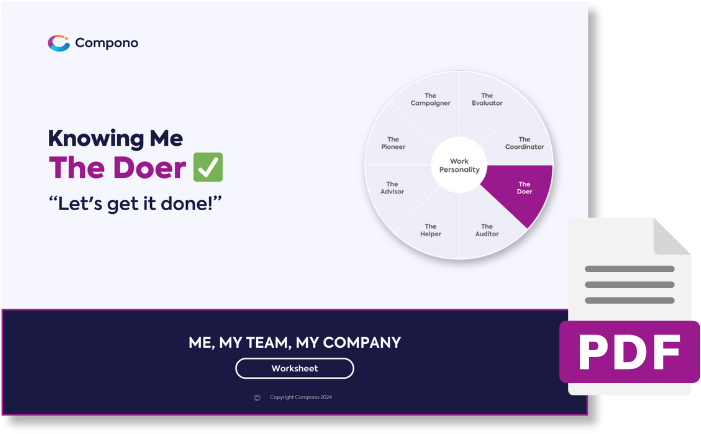
- Are you known for providing practical, reliable, and organised approaches to tasks within your team?
- Do you have a strong focus on task completion and consistently meet deadlines?
- Is your attention to detail considered one of your key strengths when ensuring precision in task execution?
Remember, these examples are just a starting point - your worksheet is your canvas to fill with your own unique colors and shades.
Guess who?
Peer into the minds of the world's most influential leaders 📣
Ever wondered if you share a personality type with Nelson Mandela, Steve Jobs, or perhaps Mother Teresa? Here's your chance to find out, but there's a catch! We aren't revealing them upfront.
Try guessing them first. As you click each mystery card, the leader will be revealed.
These leaders are task-focused, practical, detail-oriented, reliable, efficient, and hands-on. 🤔

He transformed a single coffee shop into a worldwide sensation with his practical and hands-on approach.
Howard Schultz ✅
Former CEO of Starbucks, known for his practical, hands-on approach to building Starbucks into a global brand.

Her focus and efficiency are driving forces behind the success of a giant automaker.
Mary Barra ✅
CEO of General Motors, admired for her practical leadership and ability to focus on execution and operational efficiency.

She brought fizzy refreshments to every corner of the world with her emphasis on operational excellence.
Indra Nooyi ✅
Former CEO of PepsiCo, known for her practical and efficient leadership, focusing on execution and operational excellence.
Want to guess more influential leaders?
Career paths
The Doer finds fulfillment in hands-on and detail-oriented roles. They appreciate practicality and structure in their work environments, offering them the ability to express their meticulousness and practical approach to problem-solving.
Their preference for structured environments doesn't limit their options, it expands them. This characteristic allows them to shine brightly in their chosen profession, where their attention to detail and systematic approach are essentially valued.
Whether it’s in the role of an Accountant, Executive Assistant, Police Officer or even a Civil Engineer, the Doer stands out for their practicality and straightforwardness.
Their knack for structured procedures and environments makes them excellent fits for roles such as Logistician, Data Analyst, Financial Manager, or Compliance Officer.
The Doer’s hands-on approach also finds them engaged in roles like Construction Manager, Operations Manager, and Military Officer.
The full list:
- Accountant
- Executive Assistant
- Police Officer
- Pharmacist
- Civil Engineer
- Logistician
- Data Analyst
- Financial Manager
- Compliance Officer
- Healthcare Administrator
- Librarian
- Construction Manager
- Operations Manager
- Military Officer
- Insurance Agent
- Contracts Manager
- Mechanic
- Carpenter
- Facilities Manager
Leadership style
Individuals have natural or preferred leadership styles that align with their personality types.
For Doers, they may find aspects of their preferred leadership style easier or more challenging in certain circumstances. But that doesn't mean they can't adapt to specific situations.
Effective leaders are flexible and change their approach based on the situation.
By remaining flexible in their approach, Doers can harness their strengths while also adapting to the team's needs and the demands of the task.
The Doer's natural leadership style is:
Directive Leadership
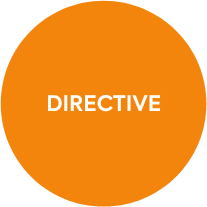
Directive Leadership involves providing clear instructions and goals, and expecting a structured approach from the team.
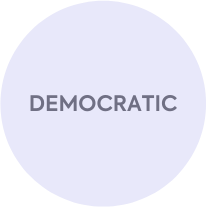
Democratic Leadership advocates for collaboration, shared decision-making, and appreciates team contributions.
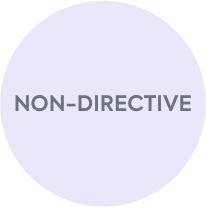
Non-Directive Leadership allows for team autonomy, offering guidance only when required.
What does this mean? 🤔
Directive Leadership is characterised by a high degree of control and structure. Leaders adopting this style provide clear instructions, set specific goals, and expect their team to follow a defined path to achieve those goals.
This leadership style works well in situations that require order, efficiency, and quick decision-making, often found in fast-paced, high-stakes environments. This style is best suited for situations where quick decisions are necessary, or the team requires clear direction to succeed. Read more.
HOW to ADAPT TO other situations
Any leadership style can be adjusted to fit different situations and team needs.
Click each tab below to discover what's easy and hard when adapting to each leadership style.
Select an option below:
- Directive
- Democratic
- Non-Directive
What's easy?
Doers thrive in directive environments where they receive clear, actionable instructions and can focus on getting things done efficiently. They excel when they know exactly what is expected of them.
Blindspots?
They may become too focused on immediate tasks and struggle with adapting to changing requirements or stepping back to allow more flexibility.
What's easy?
Doers might enjoy working independently once they are comfortable with the task at hand and understand the expectations.
Blindspots?
They may struggle with the lack of structure and specific direction, feeling lost without a clear plan or immediate tasks to focus on.
What's easy?
Doers appreciate collaboration that leads to practical solutions. They can handle team input as long as it helps streamline task execution.
Blindspots?
They may find it hard to embrace open-ended discussions or brainstorming sessions that don’t directly result in actionable tasks or clear direction.
Want to be sure if
Directive Leadership,Democratic Leadership,Non-Directive Leadership
is right for the current situation or decision your team faces?
In 10 short questions, find out the most appropriate leadership approach you can use for every team situation.

Resolving conflict in teams
For leaders, conflict within a team can seem like a daunting challenge.
Yet, when equipped with a deep understanding of each team member's unique personality, leaders can harness these moments to foster growth, spark innovation, and cultivate harmony.
Below is practical advice for leaders to navigate such scenarios effectively, based on the personality types in their team.
Click each personality type below to see practical advice for a leader to manage conflict with the Doer.
-
Auditor 🤝 Doer
Encourage the Auditor to engage earlier in discussions, e.g., “We need your feedback—how can we incorporate your detailed input into the plan?”
Help the Doer slow down and focus on details, e.g., “Let’s take time to ensure we’ve covered all the details before moving ahead.”
-
Helper 🤝 Doer
Encourage the Helper to voice their concerns confidently, e.g., “Your insights are valuable—how do you think this approach affects team morale?”
Help the Doer check in with the team’s emotional well-being, e.g., “How is this task affecting the team emotionally?”
-
Advisor 🤝 Doer
Encourage the Advisor to ensure timely decisions, e.g., “Let’s set a deadline to finalise this decision and keep the project moving.”
Help the Doer be open to flexible approaches, e.g., “Can we adjust the plan to allow for new ideas?”
-
Pioneer 🤝 Doer
Guide the Pioneer to stay focused on practical implementation, e.g., “Let’s set a timeline for these ideas to ensure progress.”
Encourage the Doer to incorporate creative thinking into their tasks, e.g., “How can we fit these new ideas into our plan?”
-
Campaigner 🤝 Doer
Help the Campaigner focus on immediate priorities, e.g., “What needs to happen now to make progress on the bigger picture?”
Encourage the Doer to connect their work to long-term goals, e.g., “How does this task contribute to our overall strategy?”
-
Evaluator 🤝 Doer
Help the Evaluator integrate immediate tasks with strategy, e.g., “How can we make sure we hit today’s goals while thinking ahead?”
Encourage the Doer to see the long-term impact, e.g., “How does this task build toward our strategy?”
-
Coordinator 🤝 Doer
Encourage the Coordinator to remain flexible, e.g., “Can we adjust the plan to incorporate new priorities?”
Help the Doer connect short-term tasks to long-term outcomes, e.g., “How does today’s task contribute to our overall goal?”
-
Doer 🤝 Doer
Help both Doers clarify priorities and responsibilities, e.g., “Let’s create a clear action plan with ownership of specific tasks.”
Encourage them to periodically assess how tasks contribute to the overall strategy.
DOES EVERYONE PLAY NICELY IN THE SANDPIT? 😉
Share the personality assessment with
your team and find out how to get along.
👇
Your personality has been mapped against the types of work crucial for high-performing teams.
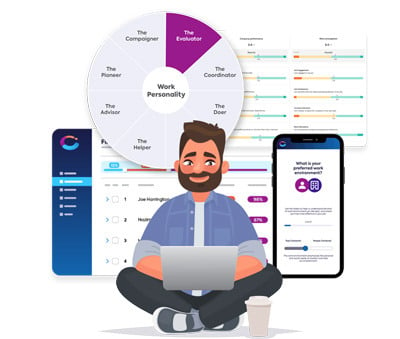
Designed by corporate psychologist, Rudy Crous.
Research identifies 8 key work types crucial for high-performing teams. If any work type shows weakness within a team, leaders can analyse the gaps and create plans to strengthen performance.
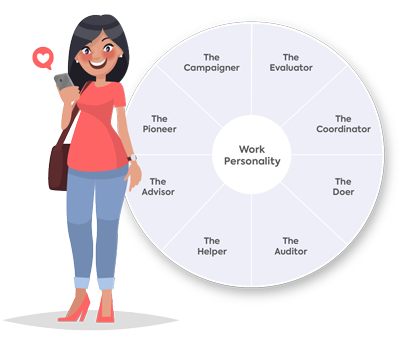
What is your Work Personality?
Reading a colleague's profile?
Or keen to take the assessment again?
Take this simple assessment and arm yourself with the insights needed to drive your performance to the next level.
Build high performing teams and individuals
Want to see more?
Our organisation design and people insights platform guides strategic people leaders to find their blind spots and take instant, actionable steps to improve.
Identify what "good" looks like
What makes your high-performers tick? Find out how they think so you can replicate their success across the business.
Reduce conflict and improve team collaboration
Help managers find potential areas of conflict in teams so that they can improve collaboration and performance.



